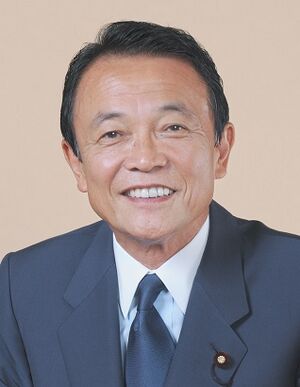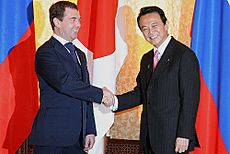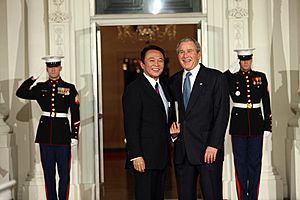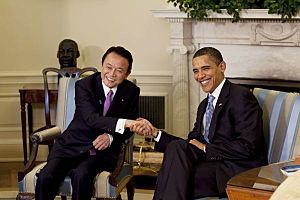Tarō Asō facts for kids
Quick facts for kids
Tarō Asō
|
|
|---|---|
|
麻生 太郎
|
|
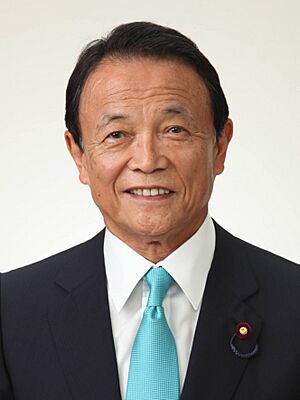
Official portrait, 2017
|
|
| Prime Minister of Japan | |
| In office 24 September 2008 – 16 September 2009 |
|
| Monarch | Akihito |
| Preceded by | Yasuo Fukuda |
| Succeeded by | Yukio Hatoyama |
| President of the Liberal Democratic Party | |
| In office 22 September 2008 – 28 September 2009 |
|
| Secretary-General | Hiroyuki Hosoda |
| Preceded by | Yasuo Fukuda |
| Succeeded by | Sadakazu Tanigaki |
| Vice President of the Liberal Democratic Party | |
| In office 8 October 2021 – 27 September 2024 |
|
| President | Fumio Kishida |
| Secretary-General | Akira Amari Toshimitsu Motegi |
| Preceded by | Masahiko Kōmura |
| Succeeded by | Yoshihide Suga |
| Deputy Prime Minister of Japan | |
| In office 26 December 2012 – 4 October 2021 |
|
| Prime Minister | Shinzo Abe Yoshihide Suga |
| Preceded by | Katsuya Okada |
| Succeeded by | Vacant |
| Minister of Finance | |
| In office 26 December 2012 – 4 October 2021 |
|
| Prime Minister | Shinzo Abe Yoshihide Suga |
| Preceded by | Koriki Jojima |
| Succeeded by | Shun'ichi Suzuki |
| Minister for Foreign Affairs | |
| In office 31 October 2005 – 27 August 2007 |
|
| Prime Minister | Junichiro Koizumi Shinzo Abe |
| Preceded by | Nobutaka Machimura |
| Succeeded by | Nobutaka Machimura |
| Minister for Internal Affairs and Communications | |
| In office 22 September 2003 – 31 October 2005 |
|
| Prime Minister | Junichiro Koizumi |
| Preceded by | Toranosuke Katayama |
| Succeeded by | Heizō Takenaka |
| Member of the House of Representatives from Fukuoka |
|
| Assumed office 8 July 1986 |
|
| Preceded by | Shinnen Tagaya |
| Constituency | Fukuoka 2nd district (1986–1996) Fukuoka 8th district (1996–present) |
| In office 7 October 1979 – 28 November 1983 |
|
| Preceded by | Asao Mihara |
| Succeeded by | Toshio Ohashi |
| Constituency | Fukuoka 2nd district |
| Personal details | |
| Born | 20 September 1940 Iizuka, Fukuoka, Empire of Japan |
| Political party | Liberal Democratic (Shikōkai) |
| Spouse | Chikako Aso |
| Children | 2 |
| Relatives | Shigeru Yoshida (grandfather) Nobuko, Princess Tomohito of Mikasa (sister) Princess Akiko (niece) Princess Yōko (niece) Ken'ichi Yoshida (uncle) Zenkō Suzuki (father-in-law) Shun'ichi Suzuki (brother-in-law) |
| Education | Gakushuin University Stanford University (dropped out) London School of Economics |
Tarō Asō (麻生 太郎, Asō Tarō, born 20 September 1940) is a Japanese politician who served as Prime Minister of Japan from 2008 to 2009. A member of the Liberal Democratic Party (LDP), he also served as Deputy Prime Minister and Minister of Finance from 2012 to 2021. He was the longest-serving Deputy Prime Minister and Minister of Finance in Japanese history, having previously served as Minister for Foreign Affairs from 2005 to 2007 and as Minister for Internal Affairs and Communications from 2003 to 2005. He leads the Shikōkai faction within the LDP.
Asō was first elected to the House of Representatives in 1979. He served in numerous ministerial roles before becoming Secretary-General of the Liberal Democratic Party (LDP) in 2008, having also held that role temporarily in 2007. He was later elected LDP President in September 2008, becoming prime minister the same month. He led the LDP to the worst election result in its history a year later, marking only the second time in post-war Japan that a governing party had lost re-election, and resigned as the President of the party immediately afterwards. After the LDP returned to government following the 2012 election under Shinzo Abe, Asō was appointed to the Cabinet as Deputy Prime Minister and Finance Minister, retaining those roles when Yoshihide Suga replaced Abe in 2020. After Fumio Kishida was appointed prime minister in October 2021, Asō was moved to the role of Vice President of the Liberal Democratic Party. He is also a noted power broker inside the party, leading the Shikōkai. He backed Taro Kono in the first round of the 2024 LDP presidential election, and then backed Sanae Takaichi, who ultimately lost to Shigeru Ishiba. Asō's role in the party is unclear under Ishiba, who told him to step down in 2009. He was visibly unhappy as Ishiba was announced the winner. He was replaced as Vice President by Yoshihide Suga, instead becoming Chief Advisor to the party.
Asō has been attached to a number of controversies in his career. He conceded in 2008 that his family had benefitted from forced labor during World War II, although he has refused to apologize for it. Asō also had a reputation for political gaffes and controversial remarks.
Contents
Family and early life
Taro Asō was born in Iizuka in Fukuoka Prefecture on 20 September 1940, as the eldest son of Takakichi Asō and his wife Kazuko. The Asō family was one of the leading business families in Kyushu, going back to Asō’s great grandfather Takichi Asō, who established himself as a coal mining magnate in the Meiji era. Takakichi Asō had taken over the family company after Takichi as a young man in the 1930s. Kazuko was the daughter of the diplomat Shigeru Yoshida, who after the war served as Prime Minister from 1946 to 1947 and 1948 to 1954. Through his maternal grandmother, Aso is also a descendant of the Meiji statesman Toshimichi Okubo, considered one of the founders of modern Japan.
Asō initially attended an elementary school affiliated with the Aso Group, but in his third year of elementary school he transferred to Gakushuin in Tokyo, the traditional school for children of the aristocracy. He graduated from Gakushuin University in 1963. He took the employment examination for the Sankei Shimbun, but decided to continue his studied overseas instead. Asō attended Stanford University in California, but later dropped out. By his own account, his anglophile grandfather Shigeru Yoshida, who had come to see him in connection to attending the funeral of General Douglas MacArthur, was displeased with him acquiring a "lousy Californian accent," leading to him being ordered by his family to study in Britain instead. He consequently transferred to the London School of Economics.
Career
After he returned to Japan from his studies abroad, he entered the Aso Industry Company in 1966. Working for the company, he lived in Brazil during the 1960s and became fluent in Portuguese.
For two years from 1970, Asō worked in the diamond mining industry in Sierra Leone as a local representative of the Asō family at a new mining area offered by a local authority after the nationalization of the diamond industry in the country. He was forced to return to Japan at the outbreak of civil unrest in the country.
Asō served as president of the Aso Mining Company from 1973 to 1979. He was also a member of the Japanese shooting team at the 1976 Summer Olympics in Montreal and President of the Japan Junior Chamber in 1978.
Political career
Asō is affiliated with the openly historical negationist organization Nippon Kaigi.
Cabinet Minister
He joined the Cabinet of Junichiro Koizumi in 2003 as Minister of Internal Affairs and Communications. On 31 October 2005, he became Minister for Foreign Affairs. There has been some speculation that his position in the Cabinet was due to his membership in the Kōno Group, an LDP caucus led by pro-Chinese lawmaker Yōhei Kōno: by appointing Asō as Minister for Foreign Affairs, Koizumi may have been attempting to "rein in" Kōno's statements critical of Japanese foreign policy.
Candidate for the LDP Leadership
Asō was one of the final candidates to replace Koizumi as prime minister in 2006, but lost the internal party election to Shinzo Abe by a wide margin. Both Abe and Asō are conservative on foreign policy issues and have taken confrontational stances towards some East Asian nations, particularly North Korea and, to a lesser extent, the People's Republic of China. Abe was considered a more "moderate" politician than the more "hard-line" Asō, and led Asō in opinion polling within Japan. Asō's views on multilateralism are suggested in a 2006 speech, "Arc of Freedom and Prosperity: Japan's Expanding Diplomatic Horizons".
Asō acknowledged that he would most likely lose to Fukuda, but said that he wanted to run so that there would be an open election, saying that otherwise LDP would face criticism for making its choice "through back-room deals". In the President election, held on 23 September, Fukuda defeated Asō, receiving 330 votes against 197 votes for Asō.
On 1 August 2008, Fukuda appointed Asō as Secretary-General of LDP, a move that solidified Asō's position as the number two-man in the party.
Prime Minister of Japan
Unexpectedly on 1 September 2008, Fukuda announced his resignation as prime minister. Five LDP members including Asō ran for new party President to succeed Fukuda. On 21 September, one day before votes of Diet party members, Asō reportedly told a crowd of supporters outside Tokyo: "The greatest concern right now is the economy." "America is facing a financial crisis ... we must not allow that to bring us down as well." Finally on 22 September, Asō did win. He was elected as President of LDP with 351 of 525 votes (217 from 384 Diet party members, 134 from 47 prefecture branches); Kaoru Yosano, Yuriko Koike, Nobuteru Ishihara, Shigeru Ishiba got 66, 46, 37, 25 votes respectively.
Two days later on 24 September, Asō was designated by the Diet as prime minister, and was formally appointed to the office by the Emperor on that night. In the House of Representatives (lower house), he garnered 337 out of 478 votes cast; in the House of Councillors (upper house), Ichirō Ozawa, President of the main opposition Democratic Party of Japan, was named through two times of ballots. Because no agreement was reached at a joint committee of both Houses, the resolution of the House of Representatives became the resolution of the Diet, as is stipulated in the Constitution. Asō reportedly said, "If you look at the current period, it's not a stable one." and "These are turbulent times with the financial situation and everything else."
Later on the same day as his election as prime minister, Asō personally announced his new Cabinet (this is normally done by the Chief Cabinet Secretary). His Cabinet was markedly different from the preceding Cabinet under Fukuda. Five of its members had never previously served in the Cabinet, and one of them, 34-year-old Yūko Obuchi, was the youngest member of the Cabinet in the post-war era.
Prime Minister Asō flew to Washington to meet with United States President Barack Obama in February 2009. He was the first foreign leader to visit the Obama White House; however, reports suggested that the new administration was interested less in giving Asō a political boost than in sending a message that Japan continues to be an important ally and partner – a low-risk, high-payoff gesture for both Asō and Obama.
After his election as prime minister Asō was expected to dissolve the lower house to clear the way for a general election. But he repeatedly stressed the need for a functioning government to face the economic crisis and ruled out an early election. Only after passage of the extra budget for fiscal 2009 in May and facing internal pressure from the LDP after a series of defeats in regional elections – most notably the Tokyo prefectural election on 12 July – he decided to announce a general election for 30 August 2009. He dissolved the House of Representatives on 21 July 2009. The LDP lost by a landslide to the Democratic Party of Japan, in the face of record levels of post-war unemployment. Accepting responsibility for the worst (and second-only) defeat of a sitting government in modern Japanese history, Asō immediately resigned as LDP president.
Deputy Prime Minister and Minister of Finance
When Shinzo Abe returned to the Prime Minister's office in December 2012, Aso is appointed Deputy Prime Minister and Minister of Finance. He is the first former Japanese Prime Minister to subsequently serve as Deputy Prime Minister. Following Shinzo Abe's second resignation as prime minister in August 2020 due to a resurgence of ulcerative colitis, many speculated Aso would launch a leadership bid. He took many people aback when he announced that he would not seek the post. Aso maintained his position as Deputy Prime Minister under Abe's successor Yoshihide Suga, until Suga himself resigned in September 2021 and was succeeded by Fumio Kishida. Aso became the Vice President of the Liberal Democratic Party under the new LDP leader and Prime Minister Fumio Kishida.
Controversial statements
In 2001, as Minister of Finance, he was quoted as saying he wanted to make Japan a country where "rich Jews" would like to live.
On 15 October 2005, during the opening ceremony of the Kyushu National Museum which also displays how other Asian cultures have influenced Japanese cultural heritage, he praised Japan for having "one culture, one civilization, one language, and one ethnic group", and stated that it was the only such country in the world. This statement sparked controversy for what critics described as invoking Japan's imperialist and racist past.
At a lecture in Nagasaki Prefecture, Asō referred to a Japanese peace initiative on the Middle East, stating, "The Japanese were trusted because they had never been involved in exploitation there, or been involved in fights or fired machine guns. Japan is doing what the Americans can't do. It would probably be no good to have blue eyes and blond hair. Luckily, we Japanese have yellow faces."
Kyodo News reported that he had said on 4 February 2006, "our predecessors did a good thing" regarding compulsory education implemented during Japan's colonization of Taiwan.
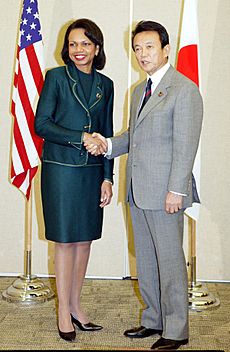
On 21 December 2005, he said China was "a neighbour with one billion people equipped with nuclear bombs and has expanded its military outlays by double digits for 17 years in a row, and it is unclear as to what this is being used for. It is beginning to be a considerable threat". On 28 January 2006, he called for the emperor to visit the controversial Yasukuni Shrine. He later backtracked on the comment, but stated that he hoped such a visit would be possible in the future.
Mainichi Daily News reported that on 9 March 2006 he referred to Taiwan as a "law-abiding country", which drew strong protest from Beijing, which considers the island a part of China.
On 23 September 2008, Akahata, the daily newspaper published by Japanese Communist Party, released a compiled list of these and other statements as the front-page article criticizing Asō. This compilation as well as similar lists of blunders have been frequently cited in the Japanese media.
Yahoo! News reported that he had said on 9 January 2009, "To work is good. It's completely different thinking from the Old Testament."
While speaking at a meeting of the National Council on Social Security Reform, in 2013, Asō referred to patients with serious illness as "tube persons" and remarked that they should be "allowed to die quickly" if they desired it. "Heaven forbid I should be kept alive if I want to die", he is quoted as saying. "You cannot sleep well when you think it's all paid by the government. This won't be solved unless you let them hurry up and die."
In 2014, while campaigning in Sapporo for the general election, Asō said that rising social welfare costs were not solely due to an aging population. He said, "There are many people who are creating the image that (the increasing number of) elderly people is bad, but more problematic is people who don't give birth". The comment was labeled as insensitive to those who are not able to have children for biological or economic reasons.
The Guardian reported on 30 August 2017, that he said, "Hitler, who killed millions of people, was no good even if his motive was right." He later retracted the remarks. On another occasion, he praised how the Nazi Party was able to stealthily and quickly change the constitution without alerting the general public.
According to The Japan Times, Asō "raised eyebrows" in June 2018 when he stated that the large support towards the LDP among voters under 35 in the 2017 general election was due to that demographic being less inclined than older Japanese to read newspapers, which had been critical of Abe's handling of cronyism scandals. .....
In October 2021, during Asō's speech for an LDP candidate in Otaru said that Hokkaido rice "has become tastier thanks to (global) warming," also adding that the rice "used to be unsalable" but now tastier and even exported "because of higher temperatures." Additionally he made the statement that people often associate global warming and the warmer temperature it brings with it as a negative but that there can be "something good" that can come out of it.
In January 2024, Aso referred to foreign minister Yoko Kamikawa as an "obasan" (roughly translated as old lady) and "not particularly beautiful" while remarking on her tenure during a speech in Fukuoka. Following widespread uproar and a rebuke by Prime Minister Fumio Kishida, Aso withdrew his remarks.
Reading mistakes
The Japanese media noted in November 2008 that Asō often mispronounced or incorrectly read kanji words written in his speeches, even though many of the words are commonly used in Japanese. Asō spoke of the speaking errors to reporters on 12 November 2008 saying, "Those were just reading errors, just mistakes." Asō's tendency for malapropisms has led comparisons to George W. Bush (see Bushism), and the use of his name, "Tarō" as a schoolyard taunt for unintelligent children.
An anatomy professor from the University of Tokyo, Takeshi Yoro, speculated that Asō could possibly have dyslexia.
Nonaka incident
In 2001, Asō, along with Hiromu Nonaka, was among the LDP's chief candidates to succeed Yoshirō Mori as prime minister of Japan. During a meeting of LDP leaders at which Nonaka was not present, Asō reportedly told the assembled group, "We are not going to let someone from the buraku become the prime minister, are we?" Asō's remark was apparently a reference to Nonaka's burakumin, a social minority group in Japan, heritage.
Nonaka subsequently withdrew as a candidate. Asō eventually lost the appointment to Jun'ichirō Koizumi. Asō's comment about Nonaka's heritage was revealed in 2005. Asō denied that he had made the statement, but Hisaoki Kamei, who was present at the 2001 meeting, stated in January 2009 that he had heard Asō say something, "to that effect". Nonaka said that he would "never forgive" Asō for the comment and went on to state that Asō was a "misery" to Japan.
Personal life
Asō is married to Chikako Suzuki, who currently serves as the director of the Asō Group and is the daughter of former Prime Minister Zenkō Suzuki. The couple were married in 1983 and have two children, Masahiro and Ayako. Masahiro served as the Niwango, the company behind the video-sharing service website Niconico in 2005 before being absorbed by Dwango in 2015. Asō is also the elder brother of Nobuko, Princess Tomohito of Mikasa and serves as the uncle of Princess Akiko of Mikasa and Princess Yōko of Mikasa.
Fondness for fine dining
In October 2008, the Japanese media reported that Asō dined out or drank in restaurants and bars in luxury hotels almost nightly. When asked about it, Asō stated, "I won't change my style. Luckily I have my money and can afford it." Asō added that if he went anywhere else, he would have to be accompanied by security guards which would cause trouble.
According to the Asahi Shimbun, Asō dined out or drank at bars 32 times in September 2008, mainly at exclusive hotels. Asō's predecessor, Yasuo Fukuda, dined out only seven times in his first month in office. Both of the LDP's opposition parties have called Asō's frequent outings inappropriate. Asō's Chief Cabinet Secretary, Jun Matsumoto, commented on the issue by saying that Asō's frequent trips to restaurants "is his lifestyle and philosophy, and I am not in a position to express my opinion. If only there were more appropriate places when considering security issues and not causing trouble for other customers."
Net worth
According to The Japan Times in 2022, Tarō Asō is the wealthiest member of Japan's National Diet. While Taro Aso's exact net worth is unknown it is estimated that his net worth is 5 billion US dollars. This would make him not just one of the wealthiest politicians in Japan but one of the wealthiest politicians in the world. 80% of his estimated wealth is inherited while 20% of his estimated wealth has been earned by him.
Manga
Asō argues that embracing Japanese pop culture can be an important step to cultivating ties with other countries, hoping that manga will act as a bridge to the world. He is referred to as an otaku.
Asō has been a fan of manga since childhood. He had his family send manga magazines from Japan while he was studying at Stanford University. In 2003, he described reading about 10 or 20 manga magazines every week (making up only part of Asō's voracious reading) and talked about his impression of various manga extemporaneously. In 2007, as Minister for Foreign Affairs, he established the International Manga Award for non-Japanese manga artists.
It was reported that he was seen reading the manga Rozen Maiden in Tokyo International Airport, which earned him the sobriquet "His Excellency Rozen". He admitted in an interview that he had read the manga; however, he said he did not remember whether he had read it in an airport. He is a fan of Golgo 13, a long-running manga about an assassin for hire.
Asō's candidacy for the position of Japanese Prime Minister actually caused share-value to rise among some manga publishers and companies related to the manga industry.
Family tree
| Toshimichi Ōkubo | Michitsune Mishima | ||||||||||||||||||||||||||||||||||||
| Nobuaki Makino | Mineko | Takichi Asō | |||||||||||||||||||||||||||||||||||
| Yukiko | Shigeru Yoshida | Tarō Asō | |||||||||||||||||||||||||||||||||||
| Ken'ichi Yoshida | Kazuko | Takakichi Asō | Zenkō Suzuki | ||||||||||||||||||||||||||||||||||
| Prince Tomohito | Princess Nobuko | Tarō Asō | Chikako | Shun'ichi Suzuki | |||||||||||||||||||||||||||||||||
| Princess Akiko | Princess Yōko | ||||||||||||||||||||||||||||||||||||
Ancestry
Incorporates information from the Japanese Wikipedia article
Asō is a patrilineal descendant of the Asō clan and is maternally descended from Ōkubo Toshimichi through his son Count Makino Nobuaki. Through his paternal grandmother the Hon. Kanō Natsuko, he descends from the Tachibana clan of the Miike Domain and from a cadet branch of the Ōkubo clan, who ruled the Odawara Domain.
| Ancestors of Tarō Asō | ||||||||||||||||||||||||||||||||||||||||||||||||||||||||||||||||||||||||||||||||||||||||||||||||||||||||||||||||||||||||||||||||||||||||||||||||||||||||||||||||||||||||||||||||||||||||||||||||||||||||||||||||||||||||||||||||||||||||||||||||||||||||||||||||||||||||||||||||||||||||||||||||||||||||||||||||||||||||||||||||||||||||||||||||||||||||||||||||||||||||||||||||||||||||||||||||||||||||||||||||||||||||||||||||||||||||||||||||||||||||||||||||||||||||||||||||||||||||||||||||||||||||||||||||||||||||||||||||||||||||||||||||||||||||||||||||||||||||||||||||||||||||||||||||
|---|---|---|---|---|---|---|---|---|---|---|---|---|---|---|---|---|---|---|---|---|---|---|---|---|---|---|---|---|---|---|---|---|---|---|---|---|---|---|---|---|---|---|---|---|---|---|---|---|---|---|---|---|---|---|---|---|---|---|---|---|---|---|---|---|---|---|---|---|---|---|---|---|---|---|---|---|---|---|---|---|---|---|---|---|---|---|---|---|---|---|---|---|---|---|---|---|---|---|---|---|---|---|---|---|---|---|---|---|---|---|---|---|---|---|---|---|---|---|---|---|---|---|---|---|---|---|---|---|---|---|---|---|---|---|---|---|---|---|---|---|---|---|---|---|---|---|---|---|---|---|---|---|---|---|---|---|---|---|---|---|---|---|---|---|---|---|---|---|---|---|---|---|---|---|---|---|---|---|---|---|---|---|---|---|---|---|---|---|---|---|---|---|---|---|---|---|---|---|---|---|---|---|---|---|---|---|---|---|---|---|---|---|---|---|---|---|---|---|---|---|---|---|---|---|---|---|---|---|---|---|---|---|---|---|---|---|---|---|---|---|---|---|---|---|---|---|---|---|---|---|---|---|---|---|---|---|---|---|---|---|---|---|---|---|---|---|---|---|---|---|---|---|---|---|---|---|---|---|---|---|---|---|---|---|---|---|---|---|---|---|---|---|---|---|---|---|---|---|---|---|---|---|---|---|---|---|---|---|---|---|---|---|---|---|---|---|---|---|---|---|---|---|---|---|---|---|---|---|---|---|---|---|---|---|---|---|---|---|---|---|---|---|---|---|---|---|---|---|---|---|---|---|---|---|---|---|---|---|---|---|---|---|---|---|---|---|---|---|---|---|---|---|---|---|---|---|---|---|---|---|---|---|---|---|---|---|---|---|---|---|---|---|---|---|---|---|---|---|---|---|---|---|---|---|---|---|---|---|---|---|---|---|---|---|---|---|---|---|---|---|---|---|---|---|---|---|---|---|---|---|---|---|---|---|---|---|---|---|---|---|---|---|---|---|---|---|---|---|---|---|---|---|---|---|---|---|---|---|---|---|---|---|---|---|---|---|---|---|---|---|---|---|---|---|---|---|---|---|---|---|---|---|---|---|---|---|---|---|---|---|---|---|---|---|---|---|---|---|---|---|---|---|---|---|---|---|---|---|---|---|---|---|---|---|---|---|---|---|---|---|---|---|---|---|---|---|---|---|---|---|---|---|---|---|---|---|---|---|---|---|---|---|---|---|---|---|---|---|---|---|---|---|---|---|---|---|---|---|---|---|---|---|---|---|---|---|---|---|---|---|---|---|---|---|---|---|
|
||||||||||||||||||||||||||||||||||||||||||||||||||||||||||||||||||||||||||||||||||||||||||||||||||||||||||||||||||||||||||||||||||||||||||||||||||||||||||||||||||||||||||||||||||||||||||||||||||||||||||||||||||||||||||||||||||||||||||||||||||||||||||||||||||||||||||||||||||||||||||||||||||||||||||||||||||||||||||||||||||||||||||||||||||||||||||||||||||||||||||||||||||||||||||||||||||||||||||||||||||||||||||||||||||||||||||||||||||||||||||||||||||||||||||||||||||||||||||||||||||||||||||||||||||||||||||||||||||||||||||||||||||||||||||||||||||||||||||||||||||||||||||||||||
Honours
Election history
| Election | Age | District | Political party | Number of votes | election results |
|---|---|---|---|---|---|
| 1979 Japanese general election | 39 | Fukuoka 2nd district | LDP | 71,041 | winning |
| 1980 Japanese general election | 39 | Fukuoka 2nd district | LDP | 85,826 | winning |
| 1983 Japanese general election | 43 | Fukuoka 2nd district | LDP | 75,412 | lost |
| 1986 Japanese general election | 45 | Fukuoka 2nd district | LDP | 134,179 | winning |
| 1990 Japanese general election | 49 | Fukuoka 2nd district | LDP | 99,876 | winning |
| 1993 Japanese general election | 52 | Fukuoka 2nd district | LDP | 101,080 | winning |
| 1996 Japanese general election | 56 | Fukuoka 8th district | LDP | 114,408 | winning |
| 2000 Japanese general election | 59 | Fukuoka 8th district | LDP | 120,178 | winning |
| 2003 Japanese general election | 63 | Fukuoka 8th district | LDP | 132,646 | winning |
| 2005 Japanese general election | 64 | Fukuoka 8th district | LDP | 145,229 | winning |
| 2009 Japanese general election | 68 | Fukuoka 8th district | LDP | 165,327 | winning |
| 2012 Japanese general election | 72 | Fukuoka 8th district | LDP | 146,712 | winning |
| 2014 Japanese general election | 74 | Fukuoka 8th district | LDP | 126,684 | winning |
| 2017 Japanese general election | 77 | Fukuoka 8th district | LDP | 135,334 | winning |
| 2021 Japanese general election | 81 | Fukuoka 8th district | LDP | 104,924 | winning |
| 2024 Japanese general election | 84 | Fukuoka 8th district | LDP | 92,534 | winning |
See also
 In Spanish: Tarō Asō para niños
In Spanish: Tarō Asō para niños


